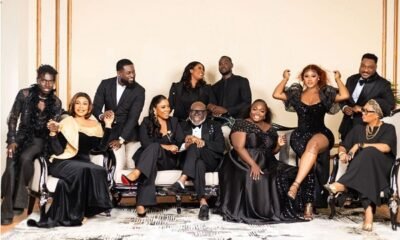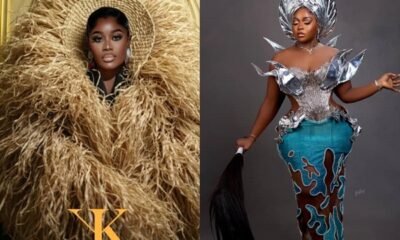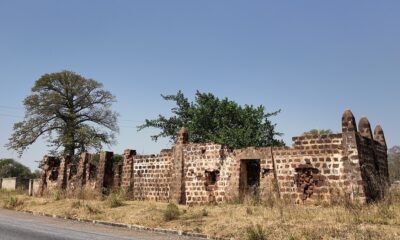Fruitful Living
Green Pastures Christian Evangelistic Foundation donates to orphanage

Green Pastures Christian Evangelistic Foundation, a non-governmental organisation (NGO) based in Accra, has donated assorted items to the ‘In My Father’s Home’ orphanage at Akatsi in the Volta Region.
The donation forms part of the foundation’s yearly corporate social responsibility to help influence lives of children living in foster homes.
Some of the items donated to the ‘In My Father’s Home’ orphanage included bags of rice, sugar, stationery, kiddie chairs among others, which was to enhance living conditions at the foster home.
Mr Frank Amenyo, a Senior Caretaker of the foster home received the items on behalf of the Manager, Mr Joseph Mensah, and thanked the Green Pastures Christians Evangelistic Foundation for the worthy gesture and asked other foundations to emulate it.
In an interview with The Spectator, Mr Edward Sam Crabbe, Head of the Green Pastures Christian Evangelistic Foundation highlighted on the need for showing love to children living in foster homes, because they needed adequate attention and care to enable them harness their talents.
According to the lawyer, quality upbringing of children living in foster homes hinges on good nutrition, strict supervision and quality education.
“Since the inception of the foundation three years ago, we have made donations to several foster homes in Ghana, and this is to harvest souls for Christ,” he indicated.
Also, Miss Gloria Akuetteh, Director of Operations at Green Pastures Christian Evangelistic Foundation called on the need for proper monitoring of orphanage homes, in order to harness the potentials of the inmates to be responsible citizens in future.
On her part, government must monitor and evaluate the affairs of every orphanage home to ensure sanity and quality services at these homes.
She revealed that, the foundation has made two donations this year and would be embarking on a donation exercise soon to put smiles on the faces of the less privileged.
“We take care of both the spiritual and basic needs of people living in the orphanage homes by sharing the word of God with them to nourish their spirit for excellence,” she reiterated.
Mrs Loretta Crabbe, Vice President of Green Pastures Christian Evangelistic Foundation and Crabbe, Crabbe and Company, was part of the team who made the presentation.
By Alfred Nii Arday Ankrah
Fruitful Living
Sanitation, Hygiene, and the Morality of Public Space: Reclaiming Ghana’s Civic Virtue through Faith and Policy (Final Part)
A. The Role of Religious Leaders and Counsellors
Religious leaders wield immense influence in shaping public values. Every mosque, church, and shrine should integrate environmental stewardship into its doctrine. Islam views the earth as a masjid—a place of prostration (Sahih Bukhari, 335). Polluting it is akin to defiling a sacred space. Monthly khutbahs should focus on amanah and tahārah, connecting spiritual purity to environmental discipline.
As a counsellor, I affirm that behavioural reform requires both moral teaching and psychological reinforcement. When believers internalise that cleaning a drain is an act of ʿibādah (worship), they transform routine labour into sacred service. The Prophet (peace be upon him) taught: “Removing harmful things from the path is a branch of faith.” (Sahih Muslim, 35). This hadith perfectly captures the theology of civic virtue.
B. Individual and Community Pledge
Moral renewal begins with personal accountability. Every household must adopt responsible waste practices—segregating recyclables, composting, and cooperating with collection services. Citizens must also exercise al-amr bi-l-maʿrūf wan-nahy ʿani-l-munkar (enjoining good and forbidding evil) by correcting neighbours who litter or misuse public spaces, with gentleness and wisdom (Qur’an 16:125).
Communities should establish local sanitation committees under mosque and church leadership, creating faith-driven accountability structures. Supporting local enforcement, rather than resisting it, must be seen as a contribution to maslahah—the public interest that the Sharia seeks to protect.
This collective moral reawakening must integrate faith, governance, and citizenship into one moral project: cleanliness as worship, sanitation as patriotism.
C. Conclusion: Cleanliness, Dignity, and the Maqāṣid al-Sharīʿah
Ghana’s destiny as a great nation is inseparable from the cleanliness of its environment and the conscience of its citizens. The choked gutters, polluted rivers, and scattered waste are not only environmental failures but spiritual wounds upon our collective soul. The Prophet (peace be upon him) said: “Allah is pure and accepts only what is pure.” (Sahih Muslim, 1015). A nation that aspires to divine favour must first reflect divine purity in its public spaces.
To achieve this, we must view sanitation through the lens of the Maqāṣid al-Sharīʿah—the higher objectives of Islamic law—which aim to preserve life (ḥifẓ al-nafs), faith (ḥifẓ al-dīn), intellect (ḥifẓ al-ʿaql), wealth (ḥifẓ al-māl), and posterity (ḥifẓ al-nasl). Clean environments are essential for all five objectives:
- Preservation of Life (ḥifẓ al-nafs): Proper sanitation prevents disease and death. Protecting human health is a divine imperative. Allah says, “And do not throw yourselves with your own hands into destruction.” (Qur’an 2:195).
- Preservation of Faith (ḥifẓ al-dīn): Islam equates purity with faith. An unclean environment obstructs worship and spiritual growth, violating the believer’s covenant of cleanliness.
- Preservation of Intellect (ḥifẓ al-ʿaql): Healthy surroundings promote clarity of thought, while pollution and disease diminish cognitive vitality and learning.
- Preservation of Wealth (ḥifẓ al-māl): Waste management safeguards public funds, prevents costly health crises, and preserves natural resources.
- Preservation of Posterity (ḥifẓ al-nasl): Environmental care ensures a habitable planet for future generations, fulfilling our amanah to the unborn.
By aligning sanitation with these higher objectives, we transform a civic duty into a sacred mission. Achieving the Maqāṣid requires cooperation between policy and piety—laws enforced justly, education grounded in values, and citizens inspired by faith.
Let every believer remember that a clean street is a silent dhikr (remembrance of Allah), a purified drain is a fulfilled amanah, and a healthy neighbour is a protected trust. When our gutters run clear and our air smells fresh, it will signify not merely progress but piety—proof that Ghana has reclaimed its moral and civic virtue under the gaze of the Almighty Allah.
Thank you.
- By Imam Alhaji SaeedBAbdulai, the Author
Join our WhatsApp Channel now!
https://whatsapp.com/channel/0029VbBElzjInlqHhl1aTU27
Fruitful Living
Being a Channel of Truth and Hope (Part III – Final)
B. Instead, walk in righteousness and true holiness … (20–24)
1. This is how you learned Christ
- As you heard Him and were taught by Him (through His apostles, of course – Matt. 28:19-20)
- In Whom is the truth – John 8:31; 14:6
2. For you were taught to “put off” the “old man”
- That is, your “former conduct,” how you behaved before you were saved – Col. 3:5-9
- Putting off the old man is needed because it is never content, but grows corrupt according to the deceitful lusts (like addictive drugs, you always need more).
3. And to “be renewed in the spirit of your mind”
- Which is the key to true “transformation” – Rom. 12:1-2
- You “renew your mind” only as you “set your mind on things above” – Col. 3:1-2
4. And to “put on the new man”
- A new man “which was created according to God” – Col. 3:10
- A new man, “in righteousness and true holiness” – Col. 3:12-17
In giving the admonition “No longer walk as the rest of the Gentiles,” Paul has made it clear that it involves both a “putting off” and a “putting on.” That is, our “Walking in Truth and Holiness” is not just a bunch of “Thou Shalt Not’s,” there are also some “Thou Shalt’s.”
To illustrate further the difference between the “old man” (how the rest of the Gentiles walk) and the “new man” (how Christians are to walk), we find Paul making…
II. The Application – (25–32)
Case in point: lying (25)
- The “old man” thinks nothing of lying
- The “new man” puts away lying, and in its place speaks truth with his neighbor (especially to those who are members of the same body)
Case in point: anger (26–27)
- The “old man” gets angry and lets it linger, or get out of control
- The “new man” may get angry, but does not…
- Let it linger (“do not let the sun go down on your wrath”)
- Allow it to prompt sinful behavior (“nor give place to the devil”)
Case in point: stealing (28)
- The “old man” is willing to steal
- The “new man” not only stops stealing, but works so he can help others in need!
Case in point: corrupt communication (29)
- The “old man” doesn’t worry or care what comes out of his mouth
- The “new man” not only avoids “corrupt communication,” but seeks to speak that which is uplifting to those who hear
Summary (30–32)
Why be concerned about putting off the “old man” and putting on the “new man?”
When Christians act like the “old man,” it grieves the Holy Spirit. By the Holy Spirit we were sealed for the day of redemption – Eph. 1:13-14.
Therefore, we ought to put away those things befitting the “old man” (bitterness, wrath, anger, clamor, evil speaking, malice). And in its place, we need to put on those things befitting the “new man” (being kind, tenderhearted, forgiving one another just as God forgives us in Christ).
Conclusion
What a contrast there would be if all those in the church truly carried out the admonition to “Walk in Truth and Holiness!” The church would stand out like “a city that is set on a hill” – Matt. 5:14-16.
And the world, though it now has “their understanding darkened,” would be more likely to come to see the truth that is in Jesus. But what hope is there if the church is more like the world than the “holy temple” it is to be?
Brethren, are we “grieving the Holy Spirit of God?” – Ephesians 4:30. While the increasing worldliness in our society naturally concerns us, let us be careful not to react with attitudes that reveal our old characteristic when we were in the world.
BY Rev. Dr Joyce Aryee,
the author







